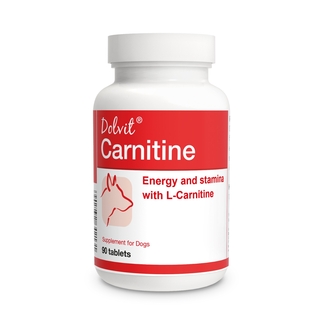Blog

L-Carnitine Deficiency in Dogs
Thursday 23rd May 2019
L-carnitine is an important nutrient that acts as a transport for fatty acids, essential for the cellular production of energy. It helps the body utilize fat for energy while maintaining the lean muscle mass which helps reduce the overall body fat.
Deficiency of this nutrient can cause a variety of health problems for animals; most significantly, the association with heart disease (cardiomyopathy) in dogs. The heart and skeletal muscles do not synthesize the nutrient on their own, requiring it to be transported there for use. Because of this, when the body is deficient in carnitine, the heart and skeletal muscles are negatively affected. While carnitine supplements are not always able to reverse the effects of this deficiency, they have proven to be the most successful course of treatment.
The signs of this deficiency may include:
Heart muscle failure
Enlarged heart (dilated cardiomyopathy)
Muscle pain
Weakness
Exercise intolerance
Weakness (lethargy)
L-carnitine is important for muscle tissue to receive energy and function normally; therefore, a deficiency in this nutrient can create a negative impact throughout a dog's body.
Causes
While causes of carnitine deficiency is unknown, it is believed some dog breeds show an increased risk of developing the deficiency, including Boxers, Doberman Pinschers, Great Danes, Irish wolfhounds, and other giant breeds.
Diagnosis
In order to diagnose this deficiency, heart (endomyocardial) muscle biopsies must be performed to measure carnitine levels.
Prevention
There are no known methods of prevention, other than maintaining a healthy diet for your dog and monitoring for signs of deficiency, especially if your dog is a breed that is known to be affected by this condition.
How much experience is there with the use of carnitine in pets?
Carnitine has been used successfully to help some dogs with dilated cardiomyopathy. A true carnitine deficiency may exist in a small number of dogs, as suggested by studies published in the 1990's showed that carnitine supplementation was beneficial in the treatment of cardiomyopathy in both American Cocker Spaniels and Boxers. Thus, in these breeds, supplementation with L-carnitine may be especially useful.
What species of animals are being treated regularly with carnitine?
Carnitine should be considered as a supplement for the treatment of obesity, cardiomyopathy, hyperlipidemia and diabetic ketoacidosis, which are conditions found in both dogs and cats. It appears to be effective for the treatment of fatty liver syndrome in cats when administered with choline.
How much research has been conducted on this supplement?
Carnitine is one of our better-researched supplements and appears to be of benefit in dogs with dilated cardiomyopathy and cats with obesity, ketosis, and fatty liver syndrome.
How successful is supplementation with carnitine?
For some dogs with true carnitine deficiency, supplementation can be life saving. For most pets with heart disease, hyperlipidemia, fatty liver syndrome, and ketoacidosis, carnitine supplementation should be used as part of an integrated treatment that includes other nutraceuticals and conventional treatments. Since L-carnitine is the active form of carnitine, this form of carnitine should be used as a supplement.
How safe is carnitine?
L-carnitine is very safe, simply because it is already a crucial constituent of almost every cell in our bodies. It is consumed whenever meat and dairy products are eaten.
"Pets that are taking anticonvulsants, particularly phenytoin (Dilantin) or phenobarbital, may need extra carnitine..."
The maximum safe dosages for young children, pregnant or nursing women, or those with severe liver or kidney disease have not been established. High doses may cause diarrhea and heartburn in humans. Pets that are taking anticonvulsants, particularly phenytoin (Dilantin) or phenobarbital, may need extra carnitine, especially those with heart disease.
Where do I obtain carnitine and do I need a prescription?
Consumers are advised that quality of supplements may vary significantly among manufacturers. Your veterinarian may have preferred supplement manufacturers that he or she will recommend. Carnitine is available over-the-counter, and is often combined with other supplements that also improve energy production.
Joint Supplement with L-Carnitine
Resources:
petmd
vcahospitals
NOTE: The content on this website is not aimed at substituting veterinary advice, and information on products is not designed to treat, cure or prevent diseases. It is necessary to do your extensive research or consult your vet before giving any supplement to your pets.

